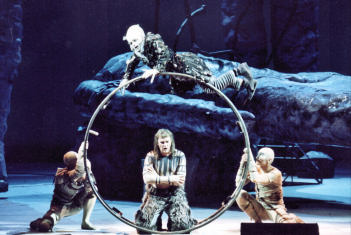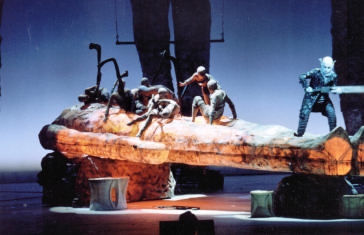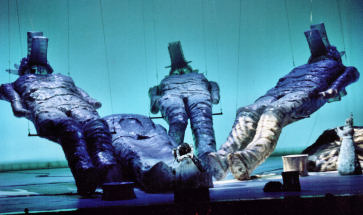|
Editorial Board
Melanie
Eskenazi
Webmaster: Len Mullenger
|
Seen and Heard Opera Review
Production Concept: Valery Gergiev and George Tsypin
The most immediate – and, I suspect, the most enduring – impression which I carried away from the Mariinsky was of the quite remarkable quality of the orchestral playing and of Valery Gergiev’s conducting. Whether in the depths of the subterranean music of the Nibelungs, in the ravishing beauty of the nature music or in some spectacular climaxes, the playing had subtlety, power, precision, and fluidity. Every section of the orchestra distinguished itself at one point or another. This was orchestral playing of the very highest order, in grace and flexibility a million miles from the stiffness that has sometimes served as Wagnerian orchestral playing. The orchestral Prelude to Scene II will long stay in the mind, as fine a performance as I have ever heard, live or on record.
For
the most part the singing was of an order one might call
highly competent, without ever quite achieving the kind
of absoluteness that lies beyond even the highest competence.
Amongst the women, Olga Savova’s Erda confirmed
the very favourable impression made by her Brünnhilde
in Die Walküre; Olga Sergeyeva’s rich
soprano brought a commanding vocal energy to the role
of Brünnhilde here, though there were moments of
wildness too. Anastasia Belyaeva was a charmingly lyrical
woodbird. Amongst the men, Vasily Gorshkov’s large
tenor voice produced some very effective moments as Mime
and Mikhail Petrenko’s bass brought a wonderful
and characteristically Russian radiance to Fafner. Edem
Umerov was in fine powerful, voice as Alberich. Leonid
Zakhozhaev, young and virile, broad shouldered and agile,
certainly looked the part of Siegfried and, more or less,
sounded it too. His tenor largely survived the demands
of the role, though with some signs of tiredness towards
the end and occasional uncertainties of pitch; still,
adjectives like decent and competent were the ones that
came most readily to mind. Vadim Kravets was inconsistent
as The Wanderer, beginning somewhat tentatively when in
dialogue with Mime, but coming into his own rather more
in his exchange with Alberich.
There was much that was very static and attempts to enliven
the action by the involvement of a troupe of dancers were
generally rather intrusive and inadequately integrated,
tending to prettify and sentimentalise. Their movements
sat very oddly with the very different world view embodied
in George Tsypin’s monumental stage set; not for
the first time in this Ring Cycle, there was
a kind of disjunctiveness amongst the elements of which
it was composed, as if there was no overall singleness
of vision applied with full concentration to the task
of unification of purpose in word and action, music and
set. The “Production Concept” is credited
to Gergiev and Tsypin, but one wonders just how much sustained
attention either of them was able to give to the details
of staging, to the integration of all the many elements
into a coherent articulation of their ‘concept’.
All pictures : © George Tsypin or
Natasha Razina
Back to the Top Back to the Index Page |
| ||
|
||||





